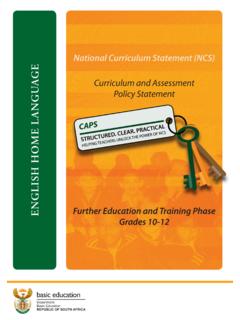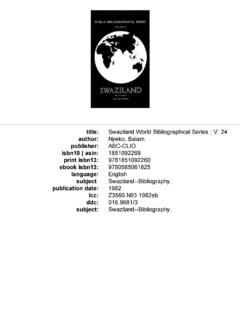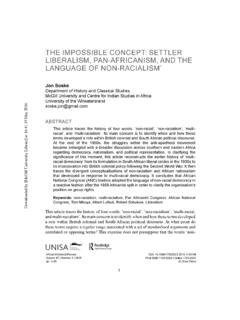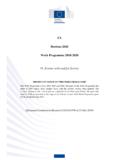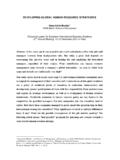Transcription of WHITE PAPER ON SOUTH AFRICA’S FOREIGN POLICY
1 Building a Better World: The Diplomacy of Ubuntu WHITE PAPER ON. SOUTH africa 'S FOREIGN POLICY . 1. Final Draft 13 May 2011. Table of Contents Foreword 3. Preamble: The Diplomacy of Ubuntu 4. Chapter 1 Introduction 6. Chapter 2 The Mandate of the Department of International Relations and 9. Cooperation (DIRC)). Chapter 3 SOUTH africa 's Values: Born in Struggle 10. Chapter 4 Through the Looking Glass: Drivers and Trends in the Global System 12. Chapter 5 Global Positioning of SOUTH africa 18. africa 20. Multilateralism 24. Economic Diplomacy 27. Wider Bilateral Interests 29. Asia 29. Middle East 30. Europe 31. American and the Caribbean 32. Chapter 6 Taking Diplomacy Forward 35. Abbreviations 37. Glossary 38. 2. Final Draft 13 May 2011. Foreword In terms of SOUTH africa 's liberation history, its evolving international engagement is based on two central tenets, namely: Pan-Africanism and SOUTH - SOUTH solidarity.
2 SOUTH africa recognises itself as an integral part of the African continent and therefore understands its national interest as being intrinsically linked to africa 's stability, unity, and prosperity. Likewise, the 1955 Bandung Conference shapes our understanding of SOUTH - SOUTH cooperation and opposition to colonialism as a natural extension of our national interest. In preparing the country to become a winning nation in the coming decades of the 21st century, our international relations work must endeavour to shape and strengthen our national identity; cultivate our national pride and patriotism; address the injustices of our past, including those of race and gender;. bridge the divides in our society to ensure social cohesion and stability; and grow the economy for the development and upliftment of our people.
3 SOUTH africa strives to promote its national interest in a complex and fast-changing world. The impact of these complexities and changes must be factored in to the nation's work to achieve a better life for its people both at home and in a regional and continental context. The business of national interest cannot be the purview of the state alone, but it can encourage an enabling environment of dialogue and discourse among all stakeholders to interrogate policies and strategies, and their application in the best interests of the people. The Department of International Relations and Cooperation therefore undertakes to conduct its business of managing SOUTH africa 's international relations ever mindful of its responsibility to the people it represents, even beyond the nation's borders. 3. Final Draft 13 May 2011.
4 PREAMBLE. DIPLOMACY OF UBUNTU. SOUTH africa is a multifaceted, multicultural and multiracial country that embraces the concept of Ubuntu as a way of defining who we are and how we relate to others. The philosophy of Ubuntu means humanity' and is reflected in the idea that we affirm our humanity when we affirm the humanity of others. It has played a major role in the forging of a SOUTH African national consciousness and in the process of its democratic transformation and nation-building. Since 1994, the international community has looked to SOUTH africa to play a leading role in championing values of human rights, democracy, reconciliation and the eradication of poverty and underdevelopment. SOUTH africa has risen to the challenge and plays a meaningful role in the region, on the continent and globally.
5 SOUTH africa 's unique approach to global issues has found expression in the concept of Ubuntu. These concepts inform our particular approach to diplomacy and shape our vision of a better world for all. This philosophy translates into an approach to international relations that respects all nations, peoples, and cultures. It recognises that it is in our national interest to promote and support the positive development of others. Similarly, national security would therefore depend on the centrality of human security as a universal goal, based on the principle of Batho Pele (putting people first). In the modern world of globalisation, a constant element is and has to be our common humanity. We therefore champion collaboration, cooperation and building partnerships over conflict. This recognition of our interconnectedness and interdependency, and the infusion of Ubuntu into the SOUTH African identity, shapes our FOREIGN POLICY .
6 SOUTH africa therefore accords central importance to our immediate African neighbourhood and continent; working with countries of the SOUTH to address shared challenges of underdevelopment;. promoting global equity and social justice; working with countries of the North to develop a true and effective partnership for a better world; and doing our part to strengthen the multilateral system, 4. Final Draft 13 May 2011. including its transformation, to reflect the diversity of our nations, and ensure its centrality in global governance. 5. Final Draft 13 May 2011. 1. INTRODUCTION. In a fast-changing and interdependent world, it is essential for SOUTH africa to regularly make an evaluation of its FOREIGN POLICY and to ensure that its national interests are maximised. FOREIGN POLICY is not an abstract matter separate from domestic policies and as such SOUTH africa ensures that these inform its FOREIGN POLICY .
7 Remaining loyal to the constitutional principles that have inspired SOUTH africa since 1994, our FOREIGN POLICY is currently based on the primacy of the African continent and the Southern African Development Community; commitment to SOUTH - SOUTH cooperation; the centrality of multilateralism; consolidating relations with the North; and the strengthening of bilateral social, political and economic relations. In her Budget Vote Speech of 22 March 2010, the Minister of International Relations and Cooperation, Ms Maite Nkoana-Mashabane, reiterated the need for SOUTH africa 's FOREIGN POLICY to be assessed against the weight of rising expectations . She also reflected on the critical role of FOREIGN POLICY in meeting domestic priorities. SOUTH africa is committed to pursuing a more focused and effective FOREIGN POLICY .
8 As principal adviser on FOREIGN POLICY issues, the Department coordinates the implementation of SOUTH africa 's international relations. To this end, the establishment of the SOUTH African Development Partnership Agency (SADPA). as an integral part of the Department will enhance SOUTH africa 's international cooperation and implementation of development and humanitarian assistance programmes. Furthermore, in the spirit of a more inclusive and open FOREIGN POLICY approach, it is the intention to further engage key stakeholders by establishing the SOUTH African Council on International Relations (SACOIR) as a forum for interaction with the Department on FOREIGN POLICY development and implementation, with the aim of creating dynamic partnerships for development and cooperation. The name change in 2009 from the Department of FOREIGN Affairs to the Department of International Relations and Cooperation reflects the Department's role in building deeper and more expansive relations and using these partnerships to advance SOUTH africa 's national interests.
9 This approach 6. Final Draft 13 May 2011. promotes FOREIGN POLICY alignment with SOUTH africa 's domestic and developmental needs, particularly to create a better life for all SOUTH Africans. SOUTH africa 's FOREIGN POLICY takes into account the ever-evolving global environment in which we operate in order to respond effectively to our domestic imperatives. Effective POLICY development is essential for the survival and prosperity of any country in the global system. Governments are faced with complex and ever rapidly occurring global inflection points and must make key strategic decisions that will determine a country's future prosperity, standing and influence in the world. SOUTH africa 's FOREIGN POLICY responses continue to be shaped by its history and the evolution of its FOREIGN and domestic policies since 1994.
10 In this regard, SOUTH africa contributes towards the transformation of the global system of governance from power-based to a rules-based system in a just and equitable global order. Since the birth of democratic SOUTH africa in 1994, the country has prioritised an Afro-centric FOREIGN POLICY rooted in national liberation, the quest for African renewal, and efforts to negate the legacy of colonialism as well as neo-colonialism. This resulted in major and ambitious African initiatives such as the New Partnership for africa 's Development (NEPAD) and support for the transition of the Organisation for African Unity (OAU) to the African Union (AU) in 2002. SOUTH africa 's FOREIGN POLICY was evaluated against the government's priorities and objectives in the Fifteen Year Review of SOUTH africa 's FOREIGN POLICY for the period 1994 to 2009.
